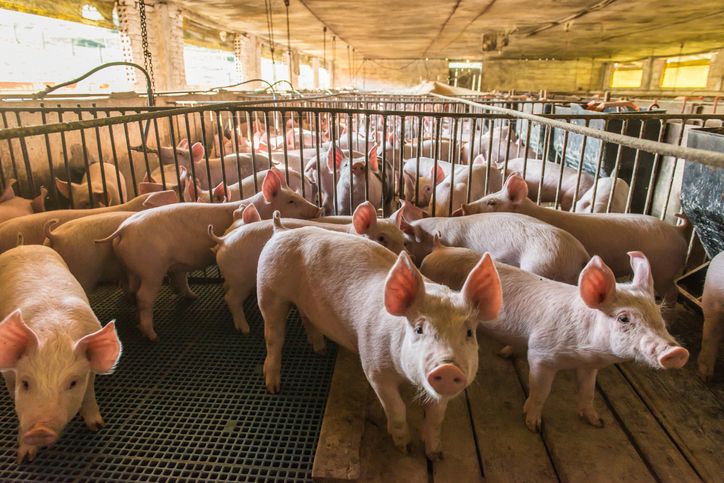Last week, the UK’s National Pig Association (NPA) warned that as many as 150,000 healthy pigs could be killed and disposed of amid a chronic shortage of slaughterhouse workers and heavy goods vehicle drivers in the country.
The UK has seen several massive livestock culls in recent decades. But, unlike those during the mad cow disease outbreak of the 1990s, and foot-and-mouth in the 2000s, it isn’t a pathogen that’s causing the latest crisis. It’s a failure in the supply chain.
And that’s unforgivable.
The pigs are healthy and expected to be fit for human consumption. But logistical problems mean they can’t be transported to slaughterhouses on time. As a result, pigs remain on farms and get older, heavier, and more costly for farmers to feed – and too large to be transported to abattoirs, even if the option becomes available.
NPA chief executive Zoe Davies told Sky News this week that she had spoken to “grown men in tears” at the thought of having to cull healthy pigs – an eventuality which her organization has been issuing warnings about since August.
“These are animals that they have reared, fed, looked after, cared for. To actually then kill something that’s perfectly healthy, to then go in the bin, it’s just criminal,” she said.
She added that there was little hope of the crisis abating anytime soon because slaughterhouses and hauliers are still struggling to recruit workers.
One week ago, Davies’ colleague, NPA chair Rob Mutimer, told the BBC that the backlog of pigs due for slaughter stood at between 100,000 and 120,000 – and was growing at around 12,000 animals each week.
“The problem in the industry has got considerably worse over the last three weeks. [A cull] involves either shooting [the pigs] on the farm or taking them to an abattoir and disposing of them in a skip,” he said.
“These animals won’t go into the food chain – they will either be rendered, or sent for incineration. It is an absolute travesty.”
Minette Batters, president of the UK National Famers Union, said that the situation is “absolutely devastating.”
“Here we are facing not only pig farmers going out of business but a welfare disaster. We are putting vets in the most horrendous position of having to shoot pigs on farm that should be going to be high quality pork in the food chain,” she told the BBC in an interview this week.
Mutimer suggested that changes to the immigration landscape following the UK’s exit from the EU at the start of last year, plus a mass outflow of foreign workers related to the Covid-19 pandemic, had critically impacted the sector’s labor supply. He also warned that UK retailers may look to import pork from other countries to plug the supply gap, further damaging the domestic industry.
Pig-headed
When pressed this week about the specter of the mass cull and incineration of healthy, food-quality animals, UK Prime Minister Boris Johnson tried to explain the crisis away by dismissing such concerns – perhaps misunderstanding that culled animals do not end up in the human food chain.
“I’m afraid our food processing industry does involve the killing [of] a lot of animals,” he told the BBC’s Andrew Marr Show. “That is the reality. Your viewers need to understand that. That’s just what happens.”
Johnson went on to suggest that the mass slaughter — as well as fuel and food shortages across the UK — were part of a necessary “period of adjustment” that the UK population “need to see” as the country restructures its economy after Covid-19 and Brexit.
Speaking later to Times Radio, Johnson appeared to accuse the BBC interviewer of “complaining,” saying he had “the unhappy duty of pointing out to [the interviewer] that that is what happens to pigs in this country.”
“I’m afraid they’re eaten very often in this country. [Have you ever eaten] a bacon sandwich?,” Johnson said. “Those pigs, when you ate them, were not alive. I’ve got to break it to you.”
But the Prime Minister’s pig-headed assessment misses — perhaps by design — the obvious point; when external factors — like pandemics or other natural disasters, or changes in geopolitical status — are to blame, it is even more critical that our food systems are able to resist such shocks.
A global problem
As the world begins the long bounceback from the Covid-19 pandemic, supply chain strain is starting to show up across multiple industries – from energy and fuel to food and fertilizer.
With border closures, movement restrictions, and factory shutdowns, global agrifood supply chains slowed to a trickle as the pandemic took hold across the world. And now, as many countries begin to jumpstart their economies in hope of returning to something that resembles pre-Covid normalcy, supply chains are struggling to wake from their slumber. Too many companies have gone out of business; too many workers have left or lost their jobs; too many migrant laborers have returned home with little likelihood of return.

The acute shortages and supply chain collapse seen in the UK appear to have been exacerbated by the country’s ‘hard exit’ from the EU single market and customs area at the start of last year. Among other things, this has led to the introduction of stringent border controls on the flow of people.
After decades of EU free movement — which enables citizens of any EU country to live and work, visa-free and with minimal limitations, in any other member state — the UK’s agrifood industries have become particularly reliant on labor from other countries in the bloc. Large numbers of EU immigrants were employed in roles from produce picking and packing to truck driving and slaughterhouse work.
Post-Brexit, many opted to leave – and Covid-19 only made it more likely that they’d choose, or be forced, to do so.
That said, Covid, Brexit, and government fecklessness aren’t root causes; they are complicating factors that have brought a major, more deep-set, problem into sharper focus.
Technological solutions
The potential slaughter and incineration of hundreds of thousands healthy pigs stands on its own two feet as being morally repugnant. But in a country with one of the highest levels of food poverty among high-income, technologically-advanced economies, the waste of so much food due to logistical and political failings is even more of a tragedy.
Then there’s the macro view. At least a tenth of the global population lives in hunger – but it’s growing faster than ever, with demand for food — and protein in particular — rising exponentially. The recently released Intergovernmental Panel on Climate Change assessment report predicts continued loss of food-producing land to rising temperatures and aridity, while urbanization and rising sea levels will also diminish productive land. The UN Food and Agriculture Organization (FAO) projects that the world won’t have enough grazing and arable land to feed itself by 2050. Moreover, food prices have hit their highest level in the past 10 years.
And yet, the FAO also says that around a third of all the food we produce is wasted somewhere along the value chain, between farm and fork.
With so many people living in hunger, demand for food rising, and productive land decreasing, we simply cannot afford to waste such a large amount of food. And the culling of potentially hundreds of thousands of healthy, fit-for-consumption animals is perhaps the most despicable kind of food waste there is.
While Johnson claims that such things “just happen” in the meat production sector, it doesn’t have to be this way. Entrepreneurs and researchers are coming up with technological solutions that can ensure that such crises do not need to happen, and that animal agriculture can become a more sustainable enterprise.
These include online ag marketplaces and direct-to-consumer platforms that can connect livestock farmers with a wider range of prospective customers, providing them with more options for selling their produce.
Then there are efforts to ‘decentralize’ meat processing through innovations such as mobile slaughter units – bringing the abbatoir closer to the farmer rather than relying on long-distance haulage and a handful of static slaughterhouse operations. Companies in this space include Australia’s Provenir and Old Parlor Meat Co in the US.
And a number of startups are coming up with new ways to turn the sidestreams of animal agriculture — such as offcuts, offal, and meat that can’t otherwise be eaten — into value-added products, like materials, feed, and ingredients. These include the UK’s own Elemental, which just raised $1.87 million via crowdfunding, and Australia’s OTH [disclosure: OTH graduated from an accelerator program run by GROW, which is backed by our parent company, AgFunder.]
Looking farther into the future, startups and corporates alike are hard at work developing alternative proteins that are made from plants or microbes, or are cultivated from animal cells. Over the long term, these can help us dial down our reliance on livestock production – further reducing the risk of senseless culls like that which the UK is now contemplating.





